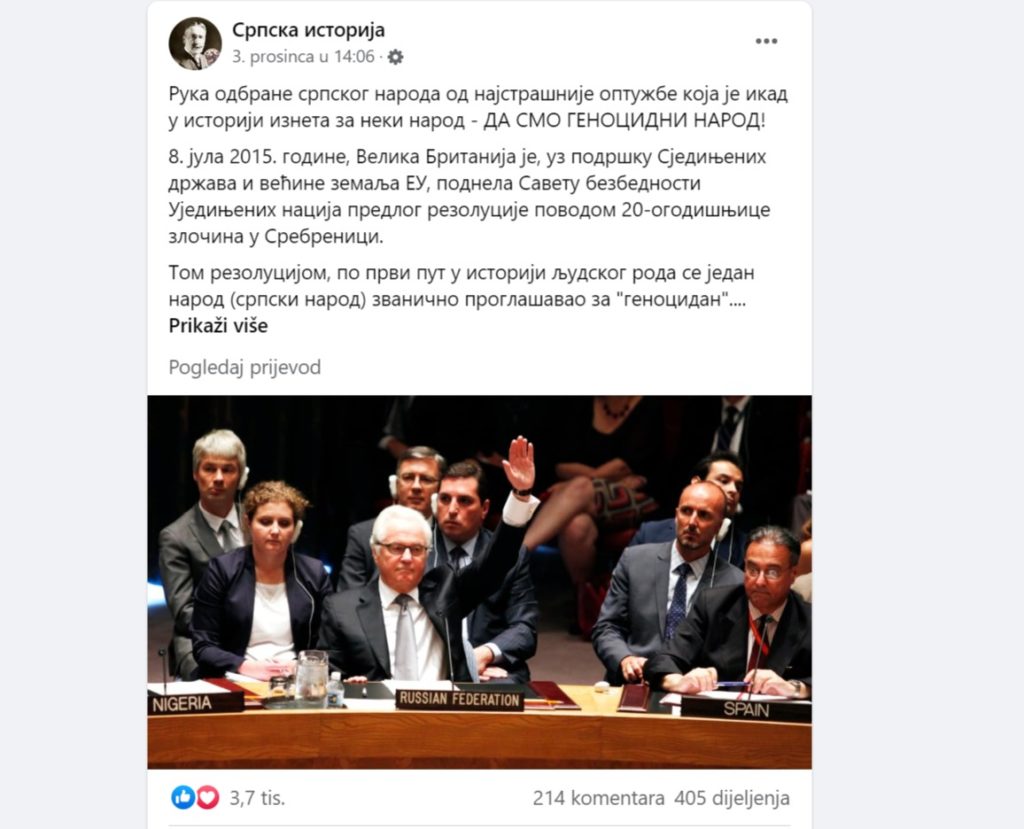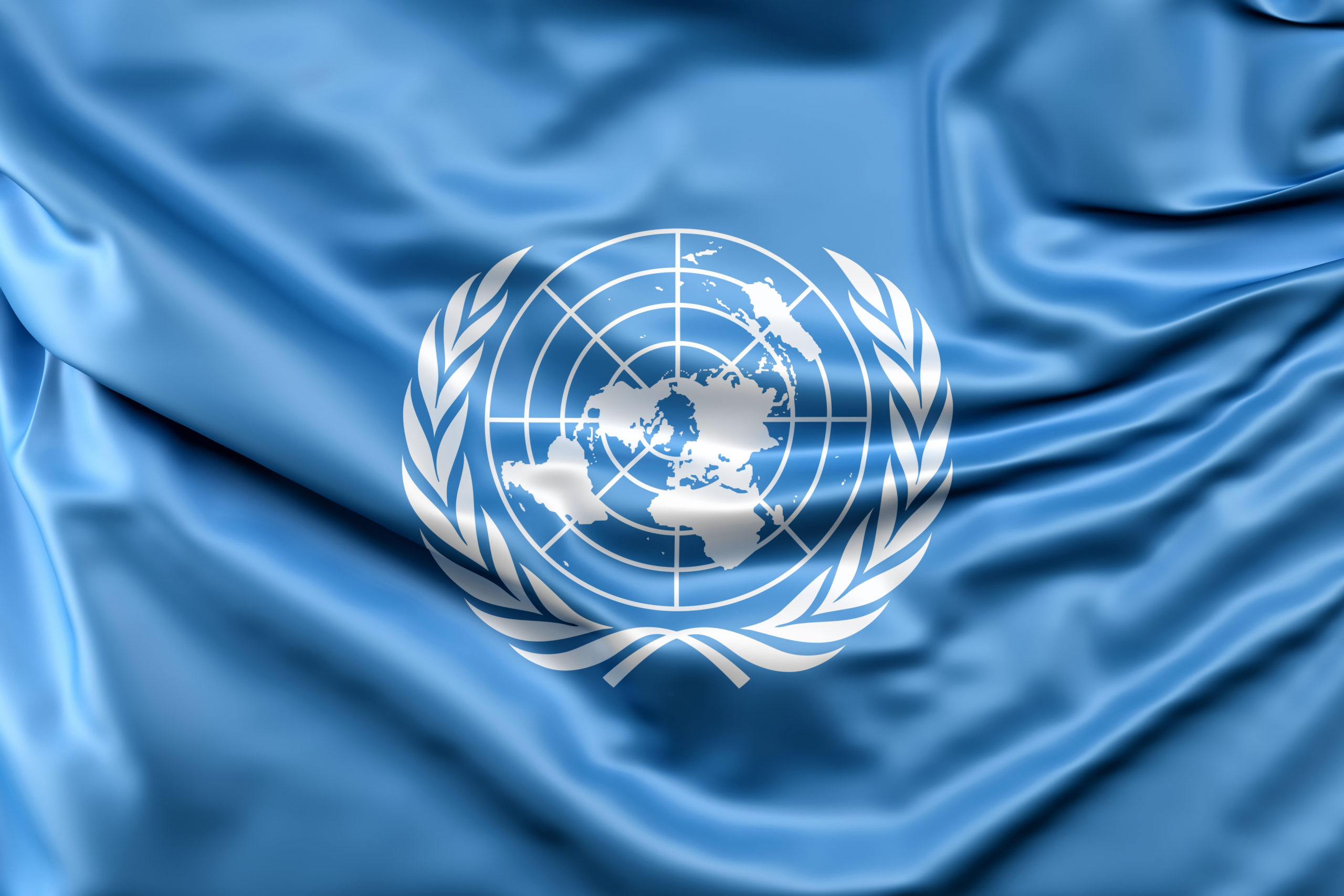Original article (in Bosnian) was published on 13/12/2022
Posts falsely claiming that Russia prevented the Serbs from being declared a genocidal nation in a UN Security Council resolution went viral this year.
In March of this year, the web portal Vidovdan published an article about the Security Council of the United Nations vote (UN) on the resolution condemning the genocide in Srebrenica. The voting took place in 2015. The article is equipped with the title:
The hand of defence of the Serbian people against the most terrible accusation that has ever been made against a nation in history—that we are a genocidal nation
The article states:
On July 8, 2015, Great Britain, with the support of the United States and most EU countries, submitted to the United Nations Security Council a proposal for a resolution on the occasion of the 20th anniversary of the crime in Srebrenica. With that resolution, for the first time in the history of the human race, one nation (Serbian people) was officially declared “genocidal”.
The article also reveals that Vitaly Churkin, the then permanent representative of Russia in the UN Security Council, stated that this country would use its right to veto the resolution.
All countries were silent. Western countries enthusiastically defended the theses expressed in such a resolution, and even the ministers of foreign affairs got involved in the whole story.
Suddenly, in the hall, a voice was heard in Russian:
“The British draft is not constructive and causes conflicts, it accuses only one nation. Such an approach is politically motivated and not legitimate”, threatening that Russia will veto it if the proposal is put to the vote. That was the voice of the Russian ambassador to the UN, Vitaly Churkin.
There is also a comment that “many are wondering what Russia has done for us” and that with this move “it has entered the golden pages of the history of the Serbs”.
The article was published by Nacionalist and Patriot web portals in March. These are slightly shorter versions of the article (1, 2) with identical titles.
Claims about adopting a resolution in the UN Security Council that would “declare the Serbian people genocidal” were also viral on Facebook in March, April, October, and December.
Among the “most viral” in December was a post from the Facebook page Srpska istorija (1) with 3,700 reactions, 214 comments and 405 shares.

What are the facts about the UN Security Council resolution proposal?
Shortly before commemorating the twentieth anniversary of the genocide in Srebrenica, Great Britain proposed the adoption of a resolution in the UN Security Council with several other UN member states, which condemns the crime of genocide committed in Srebrenica as established in the court verdicts and expresses the understanding that acceptance of the tragic events of 1995 as genocide is a condition for reconciliation.
Political leaders on all sides are called to accept the facts from the court rulings, and the denial of genocide is condemned because it hinders reconciliation and insults the victims, the draft resolution says. The draft resolution text in different languages is available for download here.
Radio Free Europe is one of the media that published the translation of the draft resolution in the languages of the local speaking area (1).
The vote in the UN Security Council on the draft resolution was held on July 8, 2015. Russia vetoed the draft during the vote. According to numerous reports from the world media (1), Russian Ambassador Vitaly Churkin stated during the veto that “adopting the resolution would be counterproductive and would lead to additional tensions”. The transcript of the UN Security Council session is available on this link.
Was the goal of the resolution to declare the nation genocidal?
The genocide in Srebrenica is a war crime that occurred in July 1995, when more than 8,000 men and boys were killed in the vicinity of this city. Judgments qualifying this crime as genocide were passed by the International Court of Justice, the International Criminal Court for the former Yugoslavia and the Court of Bosnia and Herzegovina.
According to information from the website of the Potocari Memorial Center, more than 50 people have been sentenced to a total of 700 years in prison for crimes in Srebrenica, and seven of the 20 verdicts of the International Criminal Tribunal for the former Yugoslavia for crimes in Srebrenica include verdicts for genocide.
The draft resolution submitted by Great Britain to the UN Security Council states that this body condemns in the strongest terms the crime of genocide in Srebrenica, as determined by the judgments of the International Tribunal and the International Court of Justice, and all other proven war crimes and crimes against humanity committed during the war in BiH on all sides.
Point 3 emphasises the need to accept the term “genocide” as a precondition for reconciliation.
[The UN Security Council] agrees that the acceptance of the tragic events in Srebrenica as genocide is a prerequisite for reconciliation, calls on political leaders on all sides to recognize and accept the facts of the proven crimes established by the courts and, in this sense, condemns the denial of genocide that hinders reconciliation efforts, and acknowledges that continued denial deeply traumatizes victims.
In the draft resolution, the term “people” or “nation” is not used in the context of Serbian or any other nation. The draft resolution refers to court verdicts on the genocide in Srebrenica. These verdicts do not state any claims of collective guilt but clearly and unequivocally point out individuals serving sentences for established war crimes and genocide.
Therefore, the allegation that with this resolution, “for the first time in history, there has been an attempt to declare a nation genocidal” is completely fabricated and incorrect. The resolution intended to stop denying that the crimes committed in 1995 in Srebrenica were genocide.
In accordance with the stated facts, the claim from Vidovdan’s article suggesting that Great Britain submitted a resolution to the UN Security Council declaring the Serbs as a genocidal nation is considered fake news. Nothing similar was mentioned in the draft.We assess all subsequent publications as the distribution of fake news.



